Just In
- just now

- 3 hrs ago

- 4 hrs ago

- 9 hrs ago

Don't Miss
- Finance
 Results, Dividend, Fundraise On April24: Buy Top Bank Stock Amid Rich Valuation, TP Rs 1400: Nomura
Results, Dividend, Fundraise On April24: Buy Top Bank Stock Amid Rich Valuation, TP Rs 1400: Nomura - Sports
 Who Won Yesterday's IPL Match 33? PBKS vs MI, IPL 2024 on April 17: Mumbai Indians Escape Last-Ditched Fight by Punjab Kings To Win
Who Won Yesterday's IPL Match 33? PBKS vs MI, IPL 2024 on April 17: Mumbai Indians Escape Last-Ditched Fight by Punjab Kings To Win - Movies
 Do Aur Do Pyaar OTT Release Date & Platform: When & Where To Watch Vidya Balan’s Film After Theatrical Run?
Do Aur Do Pyaar OTT Release Date & Platform: When & Where To Watch Vidya Balan’s Film After Theatrical Run? - News
 BRS Chief K Chandrasekhar Rao Slams BJP, Says K Kavitha's Arrest Is Vendetta Politics
BRS Chief K Chandrasekhar Rao Slams BJP, Says K Kavitha's Arrest Is Vendetta Politics - Automobiles
 Aprilia RS 457 Accessories: A Detailed Look At The Prices
Aprilia RS 457 Accessories: A Detailed Look At The Prices - Education
 Karnataka SSLC Result 2024 Soon, Know How to Check Through Website, SMS and Digilocker
Karnataka SSLC Result 2024 Soon, Know How to Check Through Website, SMS and Digilocker - Technology
 Nothing Ear, Ear a With ANC, Up to 42.5 Hours of Battery Launched; Check Price and Availability
Nothing Ear, Ear a With ANC, Up to 42.5 Hours of Battery Launched; Check Price and Availability - Travel
Telangana's Waterfall: A Serene Escape Into Nature's Marvels
Weaning Your Baby: Tips, Precautions, Safe Food And Foods To Avoid
If you are a breastfeeding mother, you are very much familiar with the difficulties that come with breastfeeding. But when the time comes to wean your baby off breast milk, you will learn that it poses a different set of problems of its own.
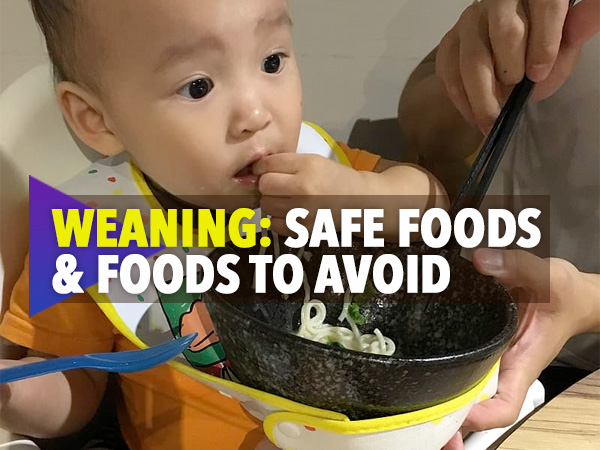
The breast milk provides your baby nutrition that is second to no other kind of replacement available. But the time comes when the baby becomes increasingly independent and must be weaned off breast milk. The choice of when to wean her baby lies solely on the mother, some health experts suggest.
Some mothers stop breastfeeding their babies as early as 3 to 4 months of age. Others wean as soon as the baby is six months old. Some other mothers go ahead and breastfeed long into the first or the second year.

When Should You Start Weaning Your Baby?
Ideally, one should not attempt to wean until the baby is at least one year of age. Six months of exclusive feeding and another six months of breastfeeding in combination with semi-solids [1]. Know that it is not going to be easy to wean your baby off breast milk. Try not to make them stop breastfeeding suddenly.

Keep in mind the following points before starting solid foods for your baby [2][3]:
Start slow: A slow but steady approach will be the best. Drop the feedings during the daytime first, as they are less likely to miss it. They will be more attached to the first feed and the last feed the most, and it might be the last to be dropped. Try a few different methods and see what suits you and your baby the best.
More attention: Once the baby receives nutrition from other sources of food, they will likely want to breastfeed for reasons other than filling up their tummy. The bonding and the comfort they receive from breastfeeding will become their primary concern [4]. In such cases, you must make it a point to shower them with a lot of attention and care when you withdraw the comfort of breastfeeding.
Baby's comfort: You may receive a lot of fighting for your baby if you try to wean the baby before they are ready. Observe your baby with watchful eyes to determine if your baby is ready for weaning. Refusal to sit for long periods to breastfeed and self-feeding solids is an excellent intimation to start weaning [5].

How To Wean At Each Age
1. Weaning At 0 To 6 Months
Ideally, one should not try to wean the baby off breast milk till the baby is six months old. But some circumstances may warrant weaning during this age. The reasons may be medical, or the mother may have to go back to work after her maternal leave is over. Whatever the case may be, weaning during this time takes a significant toll on both the mother and baby [6].
- Replace a feed with a bottle: Try to replace every feeding with a bottle of milk, as you start the weaning process. If possible, use pumped breast milk. If not, formula milk is recommended.
- Ask for help: The baby may not take to the bottled milk easily. Especially if you are the one feeding, ask your spouse, the baby's grandparents, or other caregivers to feed the baby. If the baby cannot feel you and know that breast milk is available, the baby may accept the bottle milk more readily.
- Change of location: If you do not have help, try a place that your baby is not used to bottle feeding. If you usually breastfeed your baby in the bedroom, use the living room couch to bottle feed [7].
- Find ways to bond: Try cuddling, playing together and other such activities to supplement your bond and affection.

2. Weaning At 6 To 12 Months
The senses of the baby are opening to a whole new world. They will be more interested in exploring the surroundings than sitting down calmly for hearty breastfeeding. This time might be the most comfortable period for you to wean your baby.

At around nine months, your baby may be hit with separation anxiety. It is advisable to either wean your baby before this period or wait till your baby is a little older. You can gradually wean your baby by dropping a feed at a time and not in one go as that can increase the risk of your baby becoming clingier and problems like painful, lumpy breasts and fever [8][9].

3. Weaning After 12 Months: Weaning A Toddler
Doctors say that it is almost impossible to wean a toddler.
- Use distractions: If you are weaning a toddler, you will need to use a lot of distraction methods. Whenever your child asks you for a feed, distract him/her with toys, games or even a healthy and tasty treat [10]. It is important to make your baby not think about breastfeeding. Wear clothes that hide your breasts and cleavage. Do not sit or play in the feeding areas during the daytime.
- More attention: Your baby is more likely to ask for breastfeeding if they are missing all the attention you gave before. Shower your baby with a lot of pampering and physical attention [11].

Precautions While Weaning Your Baby
However, there are certain circumstances where you should not begin the process of weaning by six months, and they are as follows:
- Allergy: If there is a history of allergies, such as asthma or eczema in the family, you might want to breastfeed your baby for a more extended period. Allergy caused due to cow's milk can be avoided if you do so. It is also proven that an extended period of breast milk feeding reduces the chances of development of allergy in the baby [12].
- Illness: Weaning is better postponed if your baby is ill. It is also advisable to push it back if you are sick too. Weaning is a huge transition period for both you and your baby. You will both be able to handle it better if you wait till you are in better health [13].
- Changes at home: Babies show distress and the need to be comforted when faced with a significant change. The change may be a move, death, or other tumultuous incidents. You may need to wait for things to be back to normal before you start the process of weaning [14][15].
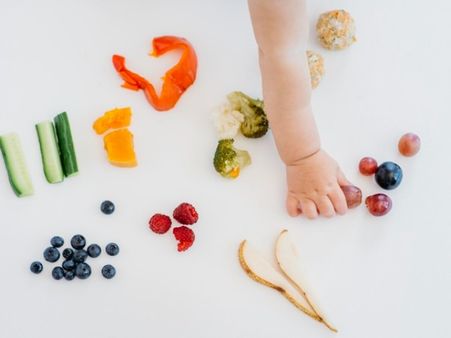
List Of Foods For Babies
When introducing new foods, make sure you do not force large quantities on your baby because the amount eaten is less important than the number of foods tried [16]. According to paediatricians, these are the appropriate first (soft) foods for your baby:
- Fruits such as banana, mango, avocado.
- Cooked or boiled fruits such as apple, plum, peach or pear.
- De-seeded guava, custard apple.
- Cooked vegetables like carrot, sweet potato, pumpkin, peas (pureed), broccoli.
- Cereals like oatmeal, rice, millet, quinoa.
- You can also start offering sips of water in a cup.
Note: Mixing foods with a little breastmilk or formula milk can improve acceptance.
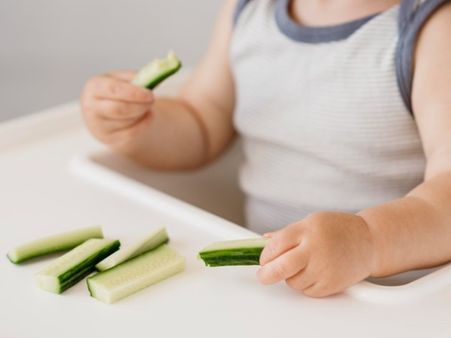
...
Once your baby is around 4 to 6 months old and regularly eating solid food, you can try the following foods:
- Plain yoghurt and cheese.
- Well-cooked eggs.
- Soft and cooked meat, poultry, and fish.
- Pulses like lentils, peas, and chickpeas.
At
around
7
to
9
months,
many
babies
can
manage
three
small
meals
each
day.
At
around
9
to
11
months,
many
babies
can
manage
family
meals
cut
into
small
bites.
At
one
year
old,
most
babies
can
eat
what
the
rest
of
the
family
eats.
Note: Remember, each baby is different, and your baby may eat depending on their own needs.
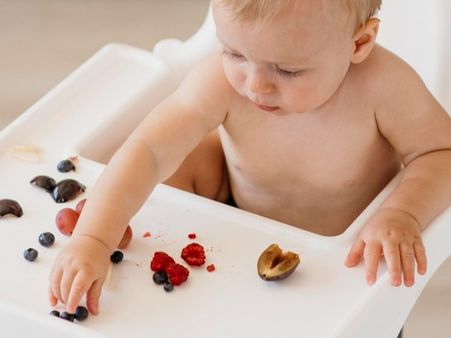
List Of Foods To Avoid For Babies
- Undercooked eggs (sunny-side-up)
- Sugary, salty, or highly processed foods or drinks
- Honey
- Low-fat products
- Cows' milk
- Unpasteurised dairy products
- Whole nuts
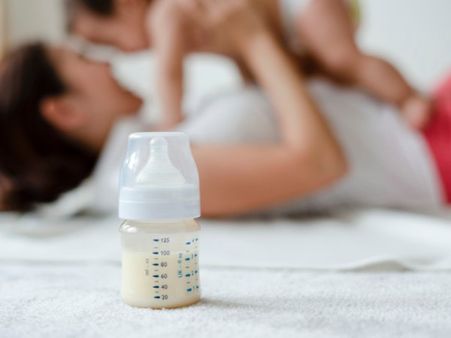
On A Final Note…
Paediatricians advise that you should not wean the baby under certain circumstances, such as, in the case of allergies, illnesses etc. Consult your baby's paediatrician before starting solid foods.
[image source: freepik]
-
 healthBreastfeeding And Periods: Is It Okay To Breastfeed Your Baby During Menstruation?
healthBreastfeeding And Periods: Is It Okay To Breastfeed Your Baby During Menstruation? -
 pregnancy parentingMyths vs Facts: You Need To Wean Once Your Baby Gets Teeth
pregnancy parentingMyths vs Facts: You Need To Wean Once Your Baby Gets Teeth -
 wellnessWhat Is Extubation? Know More About Its Benefits, Risks And How It Is Done
wellnessWhat Is Extubation? Know More About Its Benefits, Risks And How It Is Done -
 postnatalHow to wean?
postnatalHow to wean? -
 diet fitnessFlexitarian Diet: Health Benefits, Foods To Eat & Avoid And A Sample Meal Plan
diet fitnessFlexitarian Diet: Health Benefits, Foods To Eat & Avoid And A Sample Meal Plan -
 wellnessWorld Osteoporosis Day 2020: Foods That Are Bad For Osteoporosis
wellnessWorld Osteoporosis Day 2020: Foods That Are Bad For Osteoporosis -
 diet fitness13 Foods You Should Never Eat After Your Workout
diet fitness13 Foods You Should Never Eat After Your Workout -
 prenatal7 Healthy Foods To Eat During The First Trimester Of Pregnancy
prenatal7 Healthy Foods To Eat During The First Trimester Of Pregnancy -
 healthSolar Eclipse 2024: Dos and Don'ts for Pregnant Women During Surya Grahan
healthSolar Eclipse 2024: Dos and Don'ts for Pregnant Women During Surya Grahan -
 healthLunar Eclipse 2024: Dos And Don'ts For Pregnant Woman During Chandra Grahan
healthLunar Eclipse 2024: Dos And Don'ts For Pregnant Woman During Chandra Grahan -
 fashionDeepika Padukone-Ranveer Singh Announce Pregnancy: 6 Maternity Outfit Ideas For The Modern Mom-to-Be
fashionDeepika Padukone-Ranveer Singh Announce Pregnancy: 6 Maternity Outfit Ideas For The Modern Mom-to-Be -
 healthLate Singer Sidhu Moose Wala's Mother Is Pregnant Through IVF, Know What It Is And How To Prepare For It
healthLate Singer Sidhu Moose Wala's Mother Is Pregnant Through IVF, Know What It Is And How To Prepare For It


 Click it and Unblock the Notifications
Click it and Unblock the Notifications



